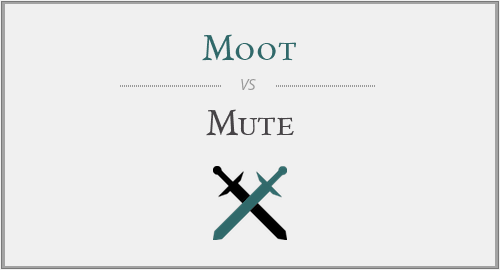Inexperienced English users can easily get tricked by “moot” and “mute”, maybe even tempted to pronounce them the same. But even though they sound similarly, they are spelled quite differently and surely define completely distinct concepts.
Check the meanings of “moot” and “mute” below to make sure you never misspell these words or get confused by them in any message. We’ll tell you how to use them correctly in just a few minutes!
Moot vs. Mute
Officially, “moot” is used mainly as an adjective, this is how you will find it defined in most of the basic English dictionaries or user’s guides. Even so, in the usual vocabulary, moot can also function as various other parts of speech, or more exactly, verb and noun.
“Mute”, on the other hand, is used both as an adjective and as a verb. But it has no relation to “moot” and the words must never be confused one for the other.
When do we use “moot”?
Mainly used as an adjective, “moot” usually appears in front of the noun “point”. The expression “moot point” refers to a certain subject that people can’t agree about. The word describes something uncertain, disputed, debatable. Anyway, in usual conversations, “moot” can also appear as a verb or as a noun. As a verb, it defines the action of suggesting a topic, an idea, a possibility or a question for further discussions or debates; as a noun, the word is rarely used and only in specialized domains, as a technical term: in history, “moot” refers to an assembly which is held for debate, while in law, the noun defines the judicial procedure of examining a hypothetical possibility/fact/case, as an exercise in an academic context.
Example 1: They’ve come to a moot point and nobody was ready to listen another opinion anymore. – “mute” as an adjective describes something disputed and uncertain that people can’t agree about.
Example 2: I am trying to moot a new scheme for our management method, get ready for a long debate. – “moot”, as a verb, refers to suggesting a new concept for further debates.
Example 3: In medieval times, a moot was something very common. – as a noun, “moot” is used in historical contexts, referring to an assembly held for debate.
Example 4: The tutor has scheduled a moot for next week, in order to help students practice their ability of developing and presenting their arguments. – in the legal context, “moot” can also be used as a noun, referring to an academic exercise of examining a hypothetical case.
When do we use “mute”?
This is quite simpler than “moot”, mainly because its meaning is easier to understand and remember, referring to the same concept both as an adjective and as a verb. “Mute” appears defined as an adjective describing either the physical or mental medical condition of not being able to speak, or something expressed only in thoughts, but not in writing or in a speech. The word, anyway, can also function as a verb, referring to the action of muffling or softening the sound of something in order to make it silent or “mute”, as the adjective would define it.
Example 1: The officer remained mute about whether he would talk to his superiors or not about the incident. – “mute”, as an adjective, can refer to not expressing something in a speech or in writing, but only in thoughts.
Example 2: Mute kids are also competent and able to learn very fast, and there are special schools to help them evolve. – also used as an adjective, “mute” can be used to describe the medical condition of not being able to speak.
Example 3: Please mute your microphone because there’s too much noise on your background. – as a verb, “mute” refers to reducing something to silence or to making something “mute”, as the adjective would describe it.
Conclusion
Even though they might sound very similar, there is nothing that “moot” and “mute” have in common. They define different concepts and are used in ever so different contexts, so not confusing them is actually easy and natural once you understand their meanings. Make sure you don’t use “moot” instead of “mute” or vice versa because they’ll obviously become serious misspellings.





Have a discussion about this article with the community:
Report Comment
We're doing our best to make sure our content is useful, accurate and safe.
If by any chance you spot an inappropriate comment while navigating through our website please use this form to let us know, and we'll take care of it shortly.
Attachment
You need to be logged in to favorite.
Log In